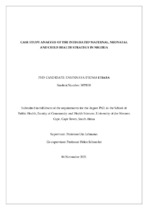| dc.contributor.advisor | Uta, Lehmann | |
| dc.contributor.author | Etiaba, Enyinnaya Ifeoma | |
| dc.date.accessioned | 2022-03-01T08:35:13Z | |
| dc.date.available | 2022-03-01T08:35:13Z | |
| dc.date.issued | 2021 | |
| dc.identifier.uri | http://hdl.handle.net/11394/8766 | |
| dc.description | Magister Artium - MA | en_US |
| dc.description.abstract | Comprehensive policies exist to tackle Nigeria’s poor maternal, neonatal and child
health (MNCH) indices, but departures from policy intent during implementation
result in less than expected outcomes. In Nigeria’s federal system of government,
national level policies are transferred to subnational level, the states as mediators of
for implementation. Executive powers at the state level reside with governors. This
study aims to contribute to a better understanding of the role of states in policy
implementation, taking a historical and comparative view of implementation of three
complex programmes, which had intergovernmental collaborative aspirations. Study
was set in two (subnational) states (Anambra and Ebonyi). In addition, national level
data were collected from Abuja – Federal Capital Territory, where policymaking is
domiciled. A qualitative case study design triangulated information from document
reviews (69) and in-depth interviews (44). Emerson’s integrated collaborative
governance (CG) framework was used to examine the overarching multi-level
governance and how this impacted the policy process. | en_US |
| dc.language.iso | en | en_US |
| dc.publisher | University of the Western Cape | en_US |
| dc.subject | Maternal, neonatal and child health | en_US |
| dc.subject | Policy process | en_US |
| dc.subject | Programmes | en_US |
| dc.subject | Multilevel governance | en_US |
| dc.subject | National | en_US |
| dc.title | Case study analysis of the integrated maternal, neonatal And child health strategy in Nigeria | en_US |
| dc.rights.holder | University of the Western Cape | en_US |

